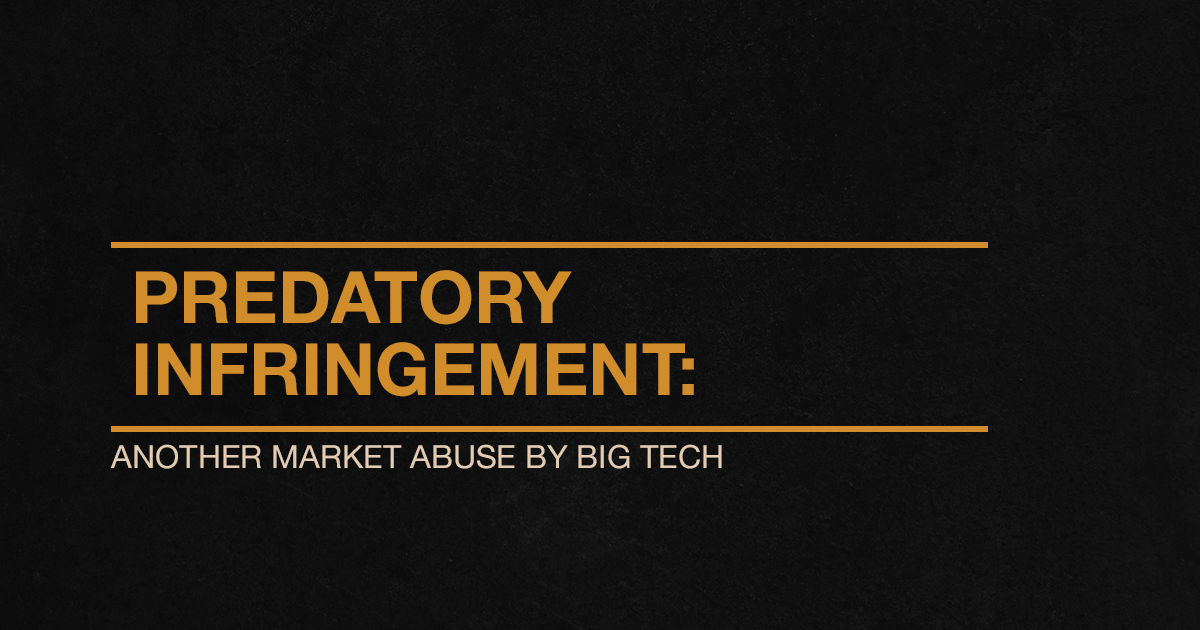Predatory Infringement: Another Market Abuse by Big Tech

While much of the recent antitrust scrutiny of Big Tech companies has focused on their abuse of market dominant positions in areas of pricing, search, advertising and publishing, there is another important area where these companies have been abusing their positions to squash competition: patents.
For years now, Big Tech companies have successfully advocated for and taken advantage of weakened patent protections in the United States to infringe on the patents of smaller inventors with impunity. These large corporations now often find it is cheaper to steal the ideas of a smaller inventor and fight off any legal challenge in court than it is to pay a fair licensing fee for the use of an invention. They know they can use their wealth, legal resources and weakened patent laws to drag out legal proceedings until small inventors give up or go under. This practice is known as “efficient infringement” or “predatory infringement,” though a more accurate term is “theft.”
Not only does “predatory infringement” result in lost revenue for small inventors, it also undermines our entire innovation economy. If smaller inventors know how hard it is to enforce their patents against Big Tech companies, who are willing to use every legal tool to delay and increase the costs of enforcement for inventions they are knowingly stealing, those inventors won’t take the risk of devoting their time and resources to innovation, and investors will no longer fund them. The result will be less innovation, less competition and less economic growth and job creation in the United States.
The case of Google and Sonos is a recent example of predatory infringement by a Big Tech company:
Google’s Infringement of Sonos
Sonos is a California-based developer and manufacturer of wireless home audio products, including smart speakers. In 2013, Sonos worked with Google to allow Google’s music service to work with Sonos’s home speakers. For the project, Sonos gave Google engineers detailed diagrams on how its speakers interacted wirelessly with one another. At the time, Google was not a competitor in the home speaker industry.
A few years later, however, Google began selling wireless home speaker products that were similar to what Sonos was offering, but at lower prices. Sonos bought the Google devices and conducted analyses that determined that Google was using Sonos’s patented device communication technology, including synchronizing audio across groups of speakers, adj
usting the group volume, and setting up devices on a local wireless network. In August 2016, Sonos told Google that it was infringing.Google largely ignored Sonos and even released more products that violated more of Sonos’s patents over the following years. Sonos eventually identified 100 patents it believed Google had violated. Sonos proposed a model for Google to pay licensing fees for its technology, but Google declined, instead offering a model in which it would pay almost nothing.
After suffering years of having its technology stolen and losing revenue to Google’s competing products, in January 2020, Sonos finally sued Google for infringement of five of its patents and filed a separate case with the International Trade Commission calling for a ban on the import of certain infringing Google products.
In a statement on the case, Sonos CEO Patrick Spence said: “Google has been blatantly and knowingly copying our patented technology. Despite our repeated and extensive efforts over the last few years, Google has not shown any willingness to work with us on a mutually beneficial solution. We’re left with no choice but to litigate.”
In testimony before a House Judiciary Antitrust Subcommittee hearing, Spence further remarked: “These dominant companies disregard inventor's patents because they are so powerful and they are doing the cost-benefit analysis of infringing now and paying later once they have achieved dominance and moved past the point where they have to worry about competition in that market. They are exploiting today's system of enforcement to extend their dominance from one market to the next.”
